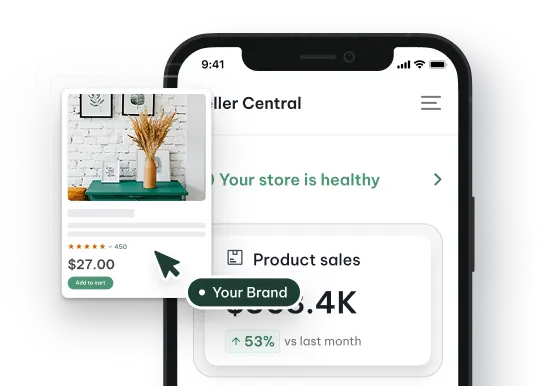Have you spent a lot of time researching the right product to sell on Amazon, only to find it restricted? Do you know about Amazon restricted categories and how they affect your listings? Don’t worry, this article from Megaficus will help you understand everything about these categories and guide you through the approval process.
Quick Summary
- Amazon restricted categories: Product categories requiring special approval from Amazon due to safety, legal, or regulatory concerns (e.g., cosmetics, automotive, healthcare).
- Amazon restricted products and brands include Adidas apparel, Disney toys, Samsung electronics, Gillette razors, Tommy Hilfiger accessories, and more.
- Tips for Approval:
- Selling in ungated categories to build a reputation.
- Use branded products when applying for restricted categories.
- Ensure compliance with quantity and authenticity requirements.
- Sourcing products locally to meet Amazon’s standards.
What Are Amazon Restricted Categories?
Amazon restricted categories are product groups that sellers cannot list immediately without special approval from Amazon. This policy exists to ensure that all sellers meet certain standards, especially for products that carry higher risks or require special expertise. These categories include potentially harmful or sensitive products, restricted brands, prohibited items, and banned products.

Why Does Amazon Have Restricted Categories And Products?
Amazon restricts certain categories of products for a few key reasons. One reason is that some categories require special certification or licenses to sell. For example, alcohol and tobacco are restricted because sellers must have a proper license to offer these products.
Another reason is that some products are considered dangerous or potentially harmful. Categories like weapons and ammunition are restricted because they could cause serious harm if misused.
Finally, some categories are restricted because Amazon does not allow certain products on its platform at all. For instance, products that claim to cure specific diseases are completely banned. So, sellers cannot apply to sell these items, as Amazon prohibits them outright.

Consequences Of Violating Amazon’s Restrictions
Selling restricted products on Amazon without proper approval can lead to serious consequences for your business, such as:

- Listing Removal: Amazon will immediately remove any listings that involve restricted products being sold without approval. This can leave gaps in your inventory and may confuse potential customers interested in those items.
- Account Health Rating “At Risk”: If you violate Amazon’s restrictions policy, your Account Health Rating (AHR) will change to “At Risk” and your score will drop to between 100 and 199 points.
- Account Suspension: Repeatedly listing restricted products without approval can lead Amazon to suspend your seller account, and you may take significant time and effort to reinstate.
- Inventory Destruction: If you are an FBA seller, Amazon has the authority to destroy your unapproved restricted inventory without reimbursement, or return it to you at your own cost.
- Withholding Payments: Amazon may withhold your payments if they discover that you are selling restricted products. This action can create cash flow problems, which could further hinder your ability to operate your business.
- Account Deactivation: In serious cases, Amazon may permanently deactivate your selling privileges. This means you could be banned from the platform altogether, losing both your account and any funds associated with it, with no option for reinstatement.
- Legal Consequences: If you sell illegal or unsafe products, you may face legal action. This could include civil and criminal penalties, adding to the risks associated with selling restricted items.

Which Categories Are Restricted On Amazon?
Some categories on Amazon are gated, which means sellers must receive approval before they can sell in them. Let Megaficus show you the categories that typically involve legal, safety, or regulatory concerns:
- Audio Visual
- Automotive & Powersports products
- Baby Feeding
- Baby Activity Gear
- Baby Strollers and Carriers
- Beauty Topical
- Candles & Aromatherapy
- Collectible Coins
- Fine Art
- Gardening & Watering
- Grocery & Gourmet Foods
- Holiday Selling Requirements in Toys & Games
- Jewelry
- Join Amazon Subscription Boxes
- Made in Italy
- Music & DVD
- Medical Supplies & Equipment
- OTC Medication
- Pet Care
- Pet Food
- Personal Safety & Household products
- Power Tools
- Services
- Sports Collectibles
- Streaming Media Players
- Video, DVD, & Blu-ray
- Watches
- Wireless Accessories

Bonus: Restricted Products and Brands on Amazon
Even in categories that are generally open, some products still need approval before they can be sold. These rules usually apply to items that could be unsafe, require regulatory compliance, or belong to well-known brands. Let’s check them out right here!
Restricted Products
Sellers must meet the requirements and provide any required documentation before listing these products:
- Alcohol
- Animals & Animal-Related Products
- Art – Fine Art
- Art – Home Decor
- Automotive and powersports
- Composite Wood Products
- Cosmetics, skin, and hair care
- CPAP Cleaning and Disinfecting Devices
- Currency, Coins, Cash Equivalents, and Gift Cards
- Dietary supplements
- Drugs and drug paraphernalia
- Electronics
- Explosives, weapons, and related items
- Export Controls
- Food & Beverage
- Gambling & Lottery
- Hazardous and prohibited items
- Human Parts & Burial Artifacts
- Jewelry & Precious Gems
- Laser products
- Lighting
- Lock Picking & Theft Devices
- Medical devices and accessories
- Offensive and Controversial Materials
- Other restricted products
- Pest control products and pesticides
- Plant and Seed Products
- Postage meters and stamps
- Prohibited Product Claims
- Recalled products
- Recycling electronics
- Refrigerants: Ozone-Depleting Substances and Substitutes
- Strike anywhere matches
- Surveillance Equipment
- Tobacco & Tobacco-Related Products
- Warranties, Service Plans, Contracts, and Guarantees
- Upholstered Furniture, Bedding, & Other Quilted Products
- Federal Emissions – Products requiring EPA Certificate of Conformity
- Children’s footwear
- Children’s apparel
- Automotive tires, wheels, and rims
- Washington State expanded polystyrene

Restricted Brands
Some brands require sellers to obtain approval before they can be sold on Amazon. Therefore, if a seller tries to list a restricted brand, they will be notified that approval is needed. Several brands that are widely known to have selling restrictions are:
- Adidas
- Disney
- LEGO
- Samsung
- Chanel
- Black & Decker
- Electronic Arts
- Fisher-Price
- Gillette
- Hasbro
- Jockey
- Keurig
- L’oreal
- Marvel
- Nabisco
- Olympus
- Panasonic
- Quaker
- RayBan
- Tommy Hilfiger
- Under Armour
- Victoria Secret
- Wilson

How To Check Restricted Products and Get Approved On Amazon?
Before attempting to sell a restricted product, first check which categories you are approved to sell in, as you may already have permission for the item. You can quickly do this in your Seller Central account by following these steps:
- Step 1: Log in to your Amazon Seller account.
- Step 2: Go to Inventory in the top menu and select Add a Product.
- Step 3: Search for your product by entering its name, UPC, EAN, ISBN, or ASIN, then click Search.
- Step 4: Locate the product in the search results.
- Step 5: Check the Status column next to the product, which can show one of three indicators:
- “Sell Yours” – The product is in an ungated category, and you can sell it without additional approval.
- “Listing limitations apply” – The product is in a gated category, and you must request approval before selling.
- “You need approval to list in this brand.” – The product belongs to a brand that requires seller approval.

If your product requires approval, you can request it by following these steps:
- Step 1: Click the “Listing limitations apply” link next to the product in the search results.
- Step 2: Click the Request Approval button to start the application process.
- Step 3: Submit all required documents, such as invoices and product images, to satisfy Amazon’s qualifications for safety and authenticity.
- Step 4: To check the status of your application, go to Add Inventory → Add Product → Selling Application Status in Seller Central.

If you find the Amazon application process challenging, you can consider hiring an expert like Megaficus to help prepare the required documents. Our services offer expert support to simplify the process while ensuring you meet Amazon’s requirements.
Tips for Getting Approval When Adding Your Product Categories
Selling in restricted categories on Amazon can be challenging, but you can follow certain strategies and prepare the right documentation to improve your chances of getting approval.
Research Your Product
Sellers should carefully investigate each product before listing and start by checking whether the product is gated and requires approval. Then, verify the product’s brand, certifications, and compliance with Amazon’s policies.
For example, if you plan to sell a health supplement, confirm that it is listed under a recognized brand and that all documentation, such as invoices and safety certificates, is valid.

Apply Using Brand Items
Amazon restricts certain categories and products to protect consumers and reduce the risk of counterfeit or defective items. Because of this, private-label products may not always qualify when applying to ungate a category.
For example, a seller who wants to sell in the health and beauty category can improve their chances of approval by including a product from a well-known brand like L’Oréal in the application.
Even if the seller eventually plans to sell private-label products, using branded items demonstrates to Amazon that the seller can source authentic and safe products, which increases the likelihood of approval.

Build A Good Seller Reputation
Getting approval to sell also depends heavily on your reputation and selling history on Amazon. Since new sellers often face rejections, it is crucial to first establish credibility by starting with ungated categories.
Once you gain experience and build a strong track record in these categories, you can gradually strengthen your account and increase your chances of being approved for restricted products.

Buy Local Or From the Manufacturer
Amazon rarely accepts invoices from overseas manufacturers for an ungating application, so purchasing directly from the manufacturer can help establish the product’s authenticity and safety.
For instance, if a seller wants to list a restricted health supplement, buying it from a certified local manufacturer rather than importing from abroad ensures that the invoice meets Amazon’s requirements and increases the likelihood of approval.

>>> Read more: 80+ Best-Selling Products on Amazon 2026: Top Picks & Trends
FAQs About Amazon Restricted Categories & Products
A restricted product refers to items that are prohibited from being sold due to legal regulations at the federal, state, or local levels. These products may also have limitations on where they can be sold, including restrictions on U.S. territories, international locations, or APO/FPO addresses.
Yes. New sellers can request approval to sell in Restricted Categories on Amazon, but the process may be more difficult because they often lack a selling history and an established reputation.
No. A retail receipt cannot replace an invoice for category approval. Amazon requires a commercial invoice from a manufacturer or authorized distributor to verify the product’s source and authenticity.
Amazon restricts certain categories (like Collectible Coins, Fine Art, or Grocery) as well as specific products in otherwise open categories.
Get Professional Help from Megaficus
Selling on Amazon is somehow challenging due to strict regulations, compliance hurdles, and potential account risks. If you want to grow your business and sell products more effectively, contact Megaficus for a free consultation and expert guidance to help you navigate the process.







